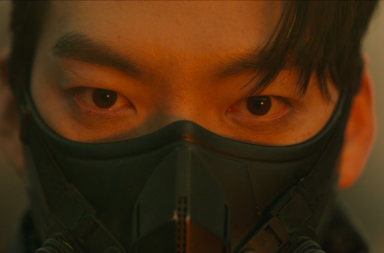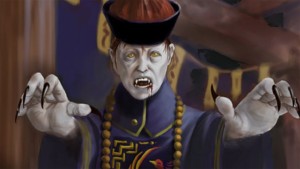 The Vampire is one of the most iconic supernatural creatures in many human cultures, and in recent years South Korean culture has introduced many of their own takes on the bloodsucker. The recently popular Scholar Who Walks the Night, which just wrapped, is the most recent version and, in fact, the most originally Korean version of the vampire.
The Vampire is one of the most iconic supernatural creatures in many human cultures, and in recent years South Korean culture has introduced many of their own takes on the bloodsucker. The recently popular Scholar Who Walks the Night, which just wrapped, is the most recent version and, in fact, the most originally Korean version of the vampire.
The creatures may have become more popular in South Korean culture in the wake of American blockbusters like Twilight and Anne Rice’s older Interview with a Vampire series, but they are very prevalent these days and it may surprise you to learn that Korea has no native vampiric tradition. The Korean vampires we see in today’s dramas and films seem to resemble a cross between the European vampire who is repelled by garlic and holy water and the hopping, zombie-like Chinese jiang shi.
Though Korea has many other traditional supernatural creatures, the only vampiric one they would have recognized generations ago is the jiang shi, a pale green-skinned, reanimated corpse that feeds by sucking out a human’s life-force. Park Chan-wook, the director of the vampire thriller Thirst (which won the Jury Prize at the 2009 Cannes Film Festival), even said, “As far as I’m aware, there is no vampire folklore in Korea. It’s only stories imported from the West that constitute the basis of this modern myth.”
However, these Korean vampires are not simply transplanted Westerners: Korean script-writers and directors and actors have made the creature their own. Whereas Western vampire lore has had time to evolve — now they differ almost as drastically as zombies do from film to film — Korean vampires are all still very similar to each other.
In each representation, you’ll find them looking very human, except for their eyes which glow red, or blue, or purple, when they show their fangs. They are super strong and often have other special powers, instantly heal themselves, are naturally vulnerable to sunlight, and immobilized by silver. Unlike in the Western tradition, though, they have no opinions whatsoever on garlic or the evilness of the holy objects of Christianity.
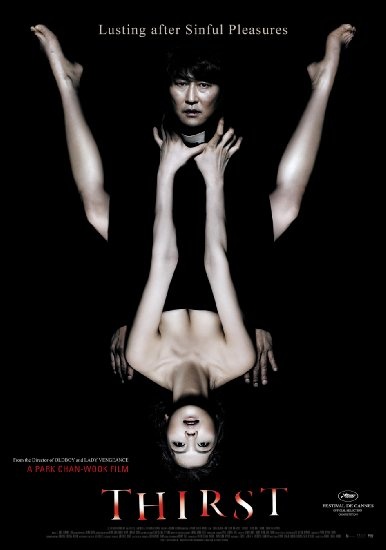 Korean vampires are naturally immortal though this, like their problem with sunlight, is often dealt with in the context of a drama plot. And it’s apparently agreed if the vampire chooses not to drink human blood that all their strong vampiric characteristics will gradually become more and more human-like (including their lifespan and innate strength).
Korean vampires are naturally immortal though this, like their problem with sunlight, is often dealt with in the context of a drama plot. And it’s apparently agreed if the vampire chooses not to drink human blood that all their strong vampiric characteristics will gradually become more and more human-like (including their lifespan and innate strength).
The Korean vampire dates back to only about 2006, when the short drama Freeze aired, starring Lee Seo-jin, Park Han-byul, and Son Tae-yung, and the movie Vampire Cop Ricky, with Kim Su-ro and Cho Yeo-jeong, was released. In the case of Vampire Cop Ricky, the vampire blood is transported directly from the great Dracula to South Korea to infect the titular cop.
This trend of introducing the Western vampire by it being like a disease literally transported from the west to the Korean peninsula was continued in Park Chan-wook’s Thirst. Song Kang-ho plays the main vampire lead, Sang-hyun, who is a Catholic Priest infected with vampirism by way of taking part in an experiment to test a medical cure while working as a missionary in Africa.
He is infected while outside South Korea and then returns as something other than a true Korean, because he is now a vampire. In this way the director, Park, can also explore the abnormal characteristics of the vampire and contrast them against those of “ordinary” Koreans, especially Sang-hyun’s newfound vampire sexuality. It’s his inability to suppress his new desires, both that of drinking blood and his sexual desires, that lead to the movie’s main plot — an affair between Sang-hyun and his best friend’s wife.
Another early example of the vampire being un-Korean is in Vampire Idol, the campy sitcom from 2011 that starred singer Lee Jung and helped launch the acting careers of Hong Jong-hyun, Lee Soo-hyuk, and Kim Woo-bin (as the three attractive yet awkward vampire bodyguards).
These four literally come from a different planet, Vamparitoos, and are stranded on Earth having to stumble through learning human ways. They each represent some part of the classic vampire – Lee Jung is the prince and the arrogant, entitled immortal; Hong Jong-hyun is a genius and knows everything about everything yet can’t figure out how to interact with people; Lee Soo-hyuk and Kim Woo-bin split the super powers between them. Woo-bin has super hearing, and Soo-hyuk has the martial arts skills and vampire blood-drinking instincts.
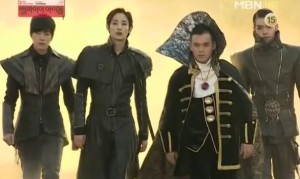 The theme of vampires being sexual beings is also something that’s very prevalent throughout these Korean dramas. It ties into both their alien identity and the western tradition of vampiric immortal youth. This is one of the aspects that starts to show in a more Korean vampire, which along with increasing their superpowers, it also makes up the image that starts appearing in recent dramas like Scholar Who Walks the Night, Blood, and Orange Marmalade.
The theme of vampires being sexual beings is also something that’s very prevalent throughout these Korean dramas. It ties into both their alien identity and the western tradition of vampiric immortal youth. This is one of the aspects that starts to show in a more Korean vampire, which along with increasing their superpowers, it also makes up the image that starts appearing in recent dramas like Scholar Who Walks the Night, Blood, and Orange Marmalade.
This Korean vampire is of a different species who are born, live, and die as vampires, though a human could be changed by being bitten. Their biggest personal battle is whether or not to drink human blood. If they do give in, their powers and life-span reach their full potential but they are more susceptible to their bodily desires. If they choose to only drink animal blood, their powers and life-span are suppressed, making them no longer immortal but still living 150-200 years.
In both Scholar Who Walks the Night and Orange Marmalade, the plot centers around the terror that humans feel regarding vampires. These two dramas should really win the award for creating a truly new Korean vampire plot, and excellent drama at the same time. Orange Marmalade is set in a world where vampires have lived for many generations alongside humans, not secretly, but protected by the government because they would otherwise be persecuted and most likely killed off in a massive genocide.
When a vampire is discovered by their neighbors, they are forced to move and take up a completely new identity to hide once more. It’s in this world that human Jung Jae-min (Yeo Jin-goo), who hates and despises vampires, falls in love with Baek Ma-ri (Kim Seol-hyun), who he doesn’t know is a vampire. Ma-ri is simply trying to live like a normal human high school student and so she allows the relationship to blossom before admitting what she is.
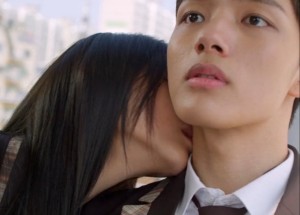 The drama plays heavy with the idea of the prejudiced other, and also relies on the ideas of vampires as uncontrollably sexual and dangerous. In one scene early on when Jae-min is first finding himself attracted to Ma-ri (and still fairly immature and very afraid), he has a nightmare that his love interest is in fact a vampire and she’s shown climbing in his window in tight black clothing to seduce him (maybe it’s not entirely a nightmare).
The drama plays heavy with the idea of the prejudiced other, and also relies on the ideas of vampires as uncontrollably sexual and dangerous. In one scene early on when Jae-min is first finding himself attracted to Ma-ri (and still fairly immature and very afraid), he has a nightmare that his love interest is in fact a vampire and she’s shown climbing in his window in tight black clothing to seduce him (maybe it’s not entirely a nightmare).
Another example is when one of the other students, Han Si-hoo (Lee Jong-hyun of CN Blue), is revealed to be a vampire as well. Because he was already something of a bad boy, the reaction of the students and parents is much stronger and they fight to get him kicked out of school. As a vampire, they see him as innately violent and dangerous.
Though they’ve been stretched out of proportion by rumor and lack of exposure, these are similar prejudices to the ones that created the governmental vampire projection agency years ago during the Joseon era. Back then there was an evil vampire trying to gain control of the entire country, and while good eventually triumphed over evil, the good vampires who formed an agreement with the government are likely better off than before. The modern vampires still have to put up a very good fight for their rights to things like education, housing, and privacy.
The plot comes from the webtoon of the same name the drama was based on, which was serialized from 2011 to 2013, and it provides a great stepping stone for the vampire plot to move from the transplanted other of Thirst to the human fighting his dark side in the newest addition of Scholar Who Walks the Night.
Scholar, based again on a manwha of the same name (from 2013), moves away from the idea of vampires as foreigners or aliens and accepts them as hauntingly native legendary creatures. Set in the Joseon era, the evil vampire villain has already been around for hundreds of years. The drama starts off and he has already been controlling the country for a few generations. His nemesis, the human-turned-vampire, “Night Scholar” Sung-yeol (Lee Joon-gi), is in comparison only 120 years old.
 The villain, Gwi (Lee Soo-hyuk reprising a vampire role, with much more feeling this time), was called by the humans to save them; he struck a deal with the king to protect the country and be given food (ie. people) in exchange. Sung-yeol is the one who is inadvertently turned vampire to receive the powers to combat and ultimately bring Gwi down. There is another vampire-human romance (with a slight twist) but it is Sung-yeol’s struggles living with himself as a vampire and Gwi’s strange moments of humanity that really create their vampire identities.
The villain, Gwi (Lee Soo-hyuk reprising a vampire role, with much more feeling this time), was called by the humans to save them; he struck a deal with the king to protect the country and be given food (ie. people) in exchange. Sung-yeol is the one who is inadvertently turned vampire to receive the powers to combat and ultimately bring Gwi down. There is another vampire-human romance (with a slight twist) but it is Sung-yeol’s struggles living with himself as a vampire and Gwi’s strange moments of humanity that really create their vampire identities.
It seems that the Korean vampire is leaning in the direction of many Western vampire tales, where the vampire sees themselves as a human who tries to live without drinking human blood and encounters human prejudice — the question of good versus evil. There are two new vampire dramas coming up in the next six months, the short film The Vampire Next Door starring Ji Sung (Kill Me Heal Me) and Vampire Detective (we’ll finally get to see Lee Joon as a vampire). It’d be interesting to see how they will broach this topic.
Vampire Detective looks to be very similar to Vampire Prosecutor from 2011, where a lawman is somehow turned into a vampire and has to solve his own case in addition to his work as a regular crime detective. It’s The Vampire Next Door that looks very interesting with Ji Sung taking on a look befitting Dr. Frankenstein or Johnny Depp. Hopefully, the full movie will be released soon.
Perhaps its because I see many parallels between the Korean reinvention of American pop and their reinvention of the vampire, but I am very much looking forward to seeing where the genre moves from here. As Korea started with K-pop by replicating 90s boy bands and have now become huge creators of original content and leaders in the world music industry, so too they seem to be very fond of the vampire and ready and willing to make it into something entirely their own.
I hope they will continue in the direction they’ve been heading and put more aspects of Korean culture and history into their vampire characters, and as we’ve already seen an excellent and more natural vampire character in Scholar Who Walks the Night who comes with a much more traditional Korean background, I for one will be cheering them on the whole way in whichever way the directors take them, as long as they don’t start sparkling.
( IMDb [1][2], Transnational and Postcolonial Vampires, The World of Chinese. Images via: MBC, The World of Chinese, CJ Entertainment, MBN, KBS, Heyi Pictures)
